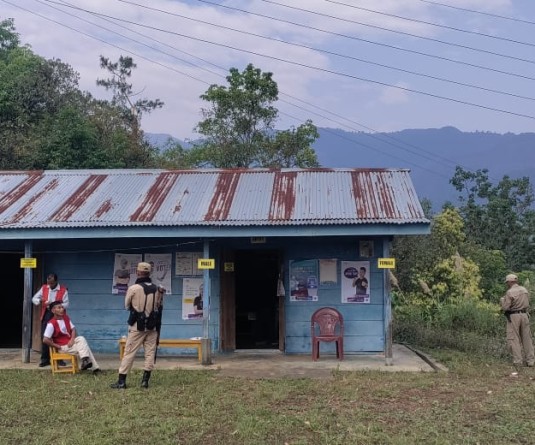
A machine used for manufacturing bamboo pulp sanitary napkin. (Morung photo)
Dimapur| July 30 : Nagaland Bamboo Research Centre (NBRC) is finding no entrepreneurs to run its “bamboo pulp sanitary” unit located in Dimapur. The unit, which was set up in 2009 with a capital investment of Rs.36 lakhs has not been functioning for more than a year. The money was used to procure machineries and train workers. The product is currently in the design and research stage but is marketable. NBRC had planned on tying up with the National Rural Health Mission to provide sanitary napkins in the rural areas but that didn’t materialize either. The unit is just lying idle waiting for buyers.
A band-aid manufacturing machine has also been put in place but that too has no takers. It is learnt that one entrepreneur had decided to run the unit but that didn’t work out. An NBRC official informed that at least Rs.3 lakh rupees would be required as working capital to run the unit. Machineries and human resources are already in place while the raw material is available at the unit.
Bamboo pulp sanitary napkin was first manufactured in China, a country thriving on bamboo value added products. Having several advantages: bamboo pulp is 300 per cent more absorbent and safer than wood pulp; it economizes on the use of wood and it compost can be made out of it. The eco-friendly pad has already hit the Indian markets costs about the same as regular pads.
The product is made under strict hygienic conditions and goes through various stages of production. In the first stage, bamboo chip is mixed with water and sent for digested pulp washing. The next stage includes bleaching the pulp with bleaching powder and sodium chloride, which is sent into washing inside the hydro extractor. The next step involves drying. The product is then compressed into absorbent layers and covered with polythene and non-woven sheet. It is then sent for cutting. The hygienic napkins are sealed with adhesive and perfumed before being sent for packing. One packet contains 10 pads. It is cheap and eco-friendly too.
A band-aid manufacturing machine has also been put in place but that too has no takers. It is learnt that one entrepreneur had decided to run the unit but that didn’t work out. An NBRC official informed that at least Rs.3 lakh rupees would be required as working capital to run the unit. Machineries and human resources are already in place while the raw material is available at the unit.
Bamboo pulp sanitary napkin was first manufactured in China, a country thriving on bamboo value added products. Having several advantages: bamboo pulp is 300 per cent more absorbent and safer than wood pulp; it economizes on the use of wood and it compost can be made out of it. The eco-friendly pad has already hit the Indian markets costs about the same as regular pads.
The product is made under strict hygienic conditions and goes through various stages of production. In the first stage, bamboo chip is mixed with water and sent for digested pulp washing. The next stage includes bleaching the pulp with bleaching powder and sodium chloride, which is sent into washing inside the hydro extractor. The next step involves drying. The product is then compressed into absorbent layers and covered with polythene and non-woven sheet. It is then sent for cutting. The hygienic napkins are sealed with adhesive and perfumed before being sent for packing. One packet contains 10 pads. It is cheap and eco-friendly too.




